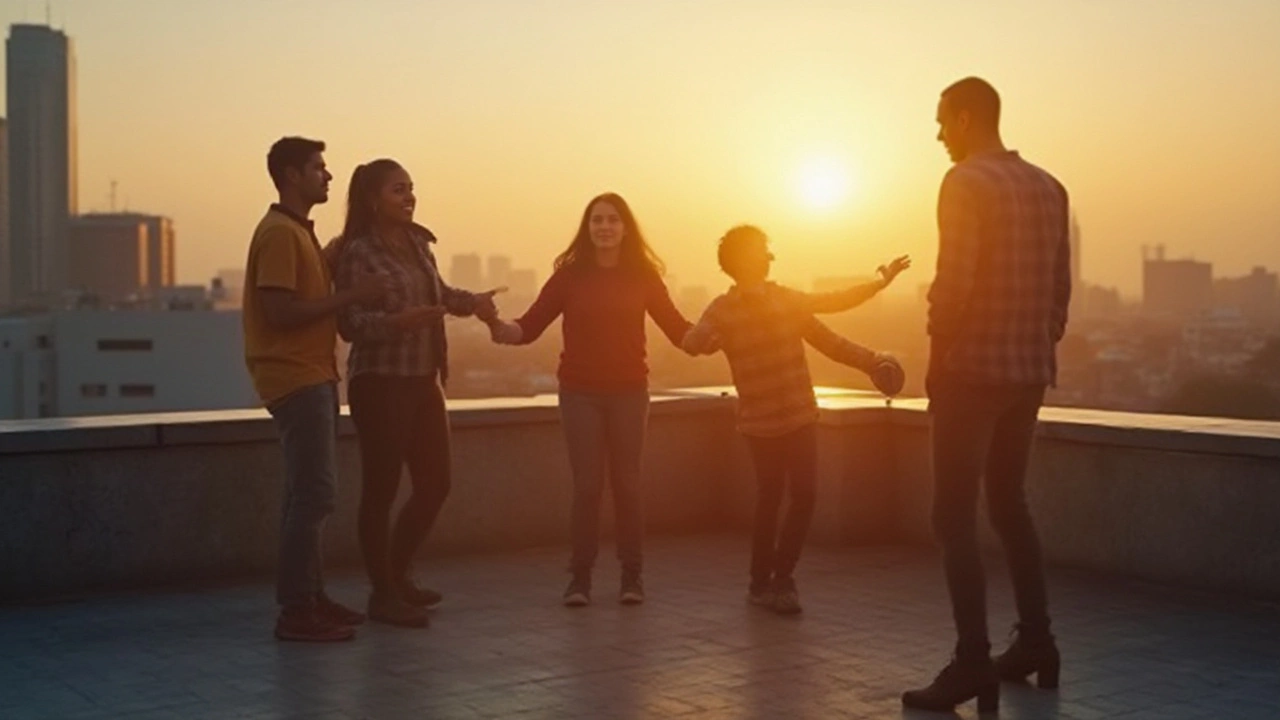Attitude Definition in One Line: Meaning, Science, and Real-Life Tips
 Jul, 3 2025
Jul, 3 2025
Ever noticed how two people can have completely opposite reactions to getting drenched in the rain? One laughs, dances, and calls it fun; the other curses their luck and wishes they'd stayed home. That’s attitude right there. Simple, invisible, but crazy powerful—it’s the tiny sentence running in your head that colors how you see the world.
Attitude in One Line: The Clear, Straight Answer
If you want attitude explained in one line, here it is: Attitude is your automatic way of thinking and feeling about people, things, or situations, which then shapes how you act. Imagine it as a mental shortcut your brain takes—like default music you play when life throws something at you. It’s not some magical power, but it changes everything.
Sometimes attitude is mistaken for personality, confidence, or even style. That’s not really it. Your attitude is that quick feeling or judgment—positive or negative—you have before your logical brain jumps in. For example, if someone cuts you off in traffic, and your immediate reaction is “Accidents happen, maybe they're in a rush,” you’re working with a flexible, patient attitude. If you think, “Why is everyone out to ruin my day?” that’s the opposite side of the attitude spectrum. It matters less what happens to you, more how you explain it to yourself. As the psychologist William James said, “The greatest discovery of my generation is that human beings can alter their lives by altering their attitudes of mind.”
Tiny, silent, but stubborn—that’s attitude for you. It’s always on, even if we don’t see it. And it doesn’t just flavor our own lives… it often spills over onto everyone we meet.
The Science Behind Attitude: Where Does It Even Come From?
Attitude doesn’t just pop up overnight. Let’s break it down—science-style. Psychologists claim attitude is built from three things: thoughts (cognitive), feelings (affective), and actions (behavioral). This is known as the “ABC model” in psychology (Affect, Behavior, Cognition). Think of it like a recipe: your beliefs about something, your gut feeling about it, and how you decide to respond.
Researchers like Gordon Allport said attitude is “a mental and neural state of readiness, organized through experience, exerting a directive or dynamic influence upon the individual’s response to all objects and situations.” Sounds fancy, but he basically meant that attitude pushes you toward certain behaviors before you even realize it. If you’ve grown up watching your dad calmly deal with setbacks, chances are, a calm attitude feels natural to you. If your friend always blows things out of proportion, they might steer you toward a more negative take—unless you notice and go your own way.
Attitude isn’t set in stone, though. Studies show that while about 30% of attitude comes from genetics (yes, we’re born with some tendencies), the rest is shaped by family, friends, culture, and even random life experiences. Remember that experiment with preschoolers and a marshmallow? Kids who held out for a bigger reward just had a different attitude toward delayed gratification. The lesson: environment + experience + a dash of DNA = your attitude recipe.

How Attitude Impacts Daily Life: From Work to Relationships
Let’s face it—attitude is like a secret filter you wear. Missed your morning coffee? Traffic jam? Annoying email? Your attitude decides if these are minor bumps or the start of a terrible day. According to a 2023 survey by the American Psychological Association, 61% of people say their everyday stress levels are directly influenced by their attitude—not by actual events. That’s wild.
At work, the person with a “can-do” attitude often gets noticed, even if their skills aren’t top-notch. A Harvard Business Review article from 2022 pointed out that managers are 48% more likely to recommend someone with a positive, resilient attitude for promotion. Relationships work the same way. Nobody enjoys hanging out with someone who always expects the worst. Ever wonder why some people attract loyal friends and supportive partners? Check their attitude—it’s usually contagious.
Even pets notice! My dog Bruno, for example, is an absolute sponge. If I’m upbeat, he’s all tail wags; if I’m cranky, he gives me that “dude, what’s your problem?” stare. Studies show animals pick up on human energy, proving that attitude isn’t just a human-to-human thing.
Nail this down with some relatable examples:
- The optimist who found opportunity during layoffs and started a new side hustle.
- The student who failed a test but used a positive attitude to double down and ace the next one.
- The person who treats a rainy day as a chance to dance in puddles, not to sulk inside.
So next time you wonder why some folks seem “lucky,” ask yourself if it’s really luck—or just attitude doing its work behind the scenes.
Shaping and Changing Attitude: Can You Really Do It?
Here’s a common myth: “I just have a bad attitude; can’t change!” Sorry, not true. Science actually says you can tweak and shape your attitude with some effort—think of it like mental muscle building. You can’t swap your basic personality overnight, but you can absolutely change how you react to things.
Let’s look at some tips for shifting attitude, backed by research, not just random advice:
- Reframe your thoughts: If you catch yourself spiraling negative, pause and flip the script. Instead of “I screwed up again,” try “What lesson can I squeeze out of this?”
- Hang around positive folks: Your attitude is like dough—it rises depending on who you mix with. Sociologists say attitude spreads like a social virus, so pick good company.
- Practice gratitude daily: Researchers at UC Davis found people who wrote three things they were grateful for each day experienced a 25% boost in well-being after just 10 weeks.
- Step back from triggers: Know what sets off your worst attitude? Build a “pause button”—journal, meditate, or walk your pet (like I do with Bruno) when stress rises.
- Set “attitude goals”: Instead of only setting goals around work or fitness, set tiny attitude shifts like “complain less at lunch” or “give a genuine compliment once a day.” Tiny changes stick better.
Here’s a cool data set comparing attitudes and real outcomes. See how much attitude shapes stuff in everyday life:
| Scenario | Negative Attitude Outcome | Positive Attitude Outcome |
|---|---|---|
| Job Loss | Stress, inertia, missed opportunities | Resilience, job hunting, new skills learned |
| Relationship Conflict | Escalation, resentment, distancing | Calm discussion, growth, increased trust |
| Exam Failure | Panic, giving up, loss of self-esteem | Motivation, extra effort, future improvement |
Not every attitudinal turnaround is life-changing, but even minor tweaks make your daily routines smoother and less stressful.

Attitude in the Real World: Famous Case Studies and Fun Facts
If you’re wondering if people really put this stuff into practice, check these stories out. Nelson Mandela, after being imprisoned for 27 years, didn’t come out bitter; he focused on reconciliation instead of revenge. That’s attitude on a world-changing scale. Or basketball legend Michael Jordan—cut from his high school team, he used a relentless attitude to fuel his legendary work ethic. Even pop stars like Lady Gaga swear by the “attitude of gratitude” as their superpower against criticism and setbacks.
Want something more everyday? Studies in workplaces show that teams with an average positive attitude can outperform more skilled but pessimistic teams by 45% (Gallup, 2021).
Ever heard of “attitude contagion”? That’s a real thing. Spend an hour with a friend who laughs in the face of setbacks, and you’re likely to walk away a bit braver yourself. Or try the opposite—hang around a chronic complainer, and see how fast your own optimism tanks. Psychologists even say the average group takes just 7 minutes to “catch” the mood of its most talkative member.
If you want to experiment, next time you’re in a group, toss out a silly joke or positive comment and watch the energy shift. You’re not just passively soaking up attitude—you’re spreading it, too.
To wrap it up, attitude isn’t just a motivational quote for your fridge. It’s a mental filter that boosts or blocks your happiness, health, work, and relationships. The best part? Unlike your height or eye color, attitude really is up to you. If you start shifting your attitude—even a tiny bit—you might be shocked at what happens next. Time to test it out?